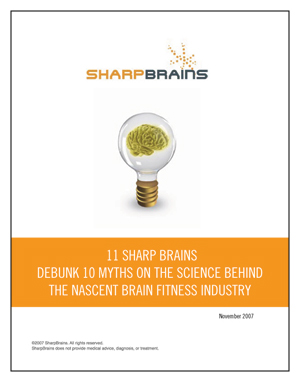Whitepaper: 10 Myths Debunked
Myth 1: It’s all in our genes.
Reality: A big component of our lifelong brain health and development depends on what we do with our brains. Our own actions, not only our genes, influence our lives to a large extent. Genes predispose us, not determine our fates.
“Individuals who lead mentally stimulating lives, through education, occupation and leisure activities, have reduced risk of developing Alzheimer’s. Studies suggest that they have 35–40% less risk of manifesting the disease — Dr. Yaakov Stern, Division Leader of the Cognitive Neuroscience Division of the Sergievsky Center at Columbia University.
Myth 2: The field of Cognitive/ Brain Fitness is too new to be credible.
Reality: The field rests on solid foundations dating back more decades — what is new is the number and range of tools that are now starting to be available for healthy individuals.
“Rigorous and targeted cognitive training has been used in clinical practice for many years. Exercising our brains systematically is as important as exercising our bodies. — Dr. Elkhonon Goldberg, neuropsychologist,
clinical professor of neurology at New York University School of Medicine, and disciple of Alexander Luria.
“Today, thanks to fMRI and other neuroimaging techniques, we are starting to understand the impact our actions can have on specific parts of the brain.” — Dr. Judith Beck, Director of the Beck Institute for Cognitive Therapy and Research.
Myth 3: Medication is and will remain the only evidence-based intervention for a number of brain-related problems.
Reality: Cognitive training programs are starting to show value as complements to drug-based interventions.
“Cognitive training rests on solid premises, and some programs already have very promising research results”- Professor David Rabiner, Senior Research Scientist and Director of Psychology and Neuroscience Undergraduate Studies at Duke University.
Education
Myth 4: We need to buy very expensive stuff to improve our brains.
Reality: Every time we learn a new skill, concept or fact, we change the physical composition of our brains. Lifelong learning means lifelong neuroplasticity.
“Learning is physical. Learning means the modification, growth, and pruning of our neurons, connections called synapses and neuronal networks, through experience…we are cultivating our own neuronal networks. — Dr. James Zull, Professor of Biology and Biochemistry at Case Western University,
Myth 5: Schools should just focus on basic skills like Reading and Math.
Reality: “Mental muscles, such as working memory, are fundamental to academic performance and are currently overlooked by the school system.
“I don’t see that schools are applying the best knowledge of how minds work. Schools should be the best place for applied neuroscience, taking the latest advances in cognitive research and applying it to the job of educating minds. — Dr. Arthur Lavin, Associate Clinical Professor of Pediatrics at Case Western School of Medicine.
Corporate Training
Myth 6: On-the-job training is the only way to train one’s mind.
Reality: Computer-based programs can be more effective at training specific cognitive skills.
“What research has shown is that cognition, or what we call thinking and performance, is really a set of skills that we can train systematically. And that computer-based cognitive trainers or “cognitive simulations are the most effective and efficient way to do so — Dr. Daniel Gopher, Professor of Human Factors Engineering at Technion Institute of Science.
Myth 7: Brain exercise is only for seniors. And, only about memory.
Reality: People of all ages can benefit from a variety of regular brain exercises. For active professionals,
managing stress and emotions is often a good first step.
“The elite performers are distinguished by the structuring of their learning process. It is important to understand the role of emotions: they are not “bad”. They are very useful signals. It is important to become aware of them to avoid being engulfed by them, and learn how to manage them. — Dr. Steenbarger, Associate Professor of Behavioral Sciences at SUNY Upstate Medical University, and author of the book Enhancing Trader Performance.
Myth 8: This all sounds too soft to be of real value to managers and professionals.
Reality: There is nothing soft about the hard science-based training of specific cognitive and emotional skills.
“I can easily see the relevance in highly competitive fields, such as professional sports and military training. — Dr. Bradley Gibson, Director of the Perception and Attention Lab at University of Notre Dame.
Serious Games
Myth 9: Videogames are always a waste of time.
Reality: Scientifically-designed, computer-based programs can be a good vehicle for training specific skills. For example, it has been shown that short term memory can be expanded by such programs.
“We have shown that working memory can be improved by training.” Dr. Torkel Klingberg, Director of the Developmental Cognitive Neuroscience Lab at Karolinska Institute.
Myth 10: This means kids will spend more time playing videogames.
Reality: In Japan the world’s earliest adopter of brain-related videogames- overall home videogame sales have declined, with children playing less over time. Interestingly, adults in Japan have started to play brain-related video games more, and we are starting to see the same trend with adults in the US and Europe.
“The sales of software on home game machines have declined (in Japan) from its peak of 533 billion yen in 1997 to 53% of that amount, 315 billion yen in 2005” — Go Hirano, Japanese executive.


